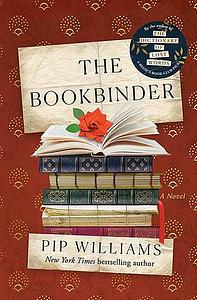Take a photo of a barcode or cover
emotional
inspiring
sad
medium-paced
Plot or Character Driven:
A mix
Strong character development:
Yes
Loveable characters:
Yes
Diverse cast of characters:
Yes
Flaws of characters a main focus:
Yes
The Bookbinder is more of a companion book than a sequel to The Dictionary of Lost Words; with more or less the same setting (turn-of-the-century Oxford, England), an introduction of new characters for the main story arc while familiar ones are sidelined to minor roles or cameos. What remains constant is the feminist perspectives of language, learning, love, loss, sacrifice, gender and class. For the development of these elements, I award five stars, but I've removed one star for the disappointing open-ended conclusion of the tale....
Spoiler
I wanted Peggy Jones to live a larger life!
challenging
emotional
hopeful
reflective
medium-paced
Plot or Character Driven:
A mix
Strong character development:
Yes
Loveable characters:
Yes
Diverse cast of characters:
Complicated
Flaws of characters a main focus:
Complicated
emotional
reflective
sad
medium-paced
Plot or Character Driven:
Character
Strong character development:
Yes
Loveable characters:
Yes
Diverse cast of characters:
Yes
Flaws of characters a main focus:
Yes
dark
emotional
informative
reflective
tense
medium-paced
Plot or Character Driven:
A mix
Strong character development:
Complicated
Loveable characters:
Yes
Diverse cast of characters:
Complicated
Flaws of characters a main focus:
Yes
This book must have involved so much research, and the author has integrated it so well. Interesting author note at the end which speaks to her process. The book is set during WW1 and speaks to the human cost of war, in all its myriad of ways. It mainly focusses on Peggy who is working class, working in the bindery binding booms, disenfranchised, but longing for something more. Great relationships depicted and it's quite a hopeful novel in spite of all its grimness. I liked the way the real world was layered into a fictional story. Eg mention of Vera Brittain as a character (but she was a real person. I studied her diary Testament of Youth back in my uni days). Very interesting story and quite compelling.
emotional
hopeful
informative
inspiring
reflective
slow-paced
Plot or Character Driven:
Character
Strong character development:
Yes
Loveable characters:
Yes
Diverse cast of characters:
Yes
Flaws of characters a main focus:
Yes
Pip Williams returns to the Press in Oxford, England, from 1914 with the beginning of WWI until 1920 with the granting (finally!) of degrees to women (who had previously graduated but not been degreed). Some of the characters from "The Dictionary of Lost Words" show up in minor and not so minor roles. The focus is on orphaned twins on the edge of adulthood from Jericho, the area where most of the press workers live. Peggy is curious and restless, longing for a Sommerville education, yet feels deeply her responsibility for Maude who has her own different, non-academically inclined gifts. Their family has worked in the Press for generations, and their mother now dead nurtured each girl's talents, bringing home scraps of damaged books for reading and storytelling, with smaller scraps for Maude to "fold" as origami.
Living on a narrow boat the girls are part of their community at work (since age 12) and on the river. Their mother had a friend (Tilda from "The Dictionary") who brings the outside world to them and then the war does--as men and boys from the Press go off, and refugees and wounded come into Oxford and the empty colleges. With its length the book has time to dig into the details of bookbinding, Town/Gown tensions, the physical and emotional losses of war on every side, the Spanish flu epidemic (now much more real to us than decades ago), autism and echolalia, being a twin, the suffrage movement, and striving for things that seem beyond your reach.
Both the twins are engaging characters. Peggy narrates, and we read her censored thoughts and her voiced ones; Maude has wisdom deeper than we realize at the beginning. The use of letters from Tilda as she serves as a volunteer, eventually in the midst of the war's hospitals, works well. The gifts of readings and books, friendship and our best selves, are all on display here. Thanks for such a wonderful read, Pip Williams!
Living on a narrow boat the girls are part of their community at work (since age 12) and on the river. Their mother had a friend (Tilda from "The Dictionary") who brings the outside world to them and then the war does--as men and boys from the Press go off, and refugees and wounded come into Oxford and the empty colleges. With its length the book has time to dig into the details of bookbinding, Town/Gown tensions, the physical and emotional losses of war on every side, the Spanish flu epidemic (now much more real to us than decades ago), autism and echolalia, being a twin, the suffrage movement, and striving for things that seem beyond your reach.
Both the twins are engaging characters. Peggy narrates, and we read her censored thoughts and her voiced ones; Maude has wisdom deeper than we realize at the beginning. The use of letters from Tilda as she serves as a volunteer, eventually in the midst of the war's hospitals, works well. The gifts of readings and books, friendship and our best selves, are all on display here. Thanks for such a wonderful read, Pip Williams!
informative
reflective
medium-paced
Plot or Character Driven:
Character
Strong character development:
Yes
Loveable characters:
Yes
Diverse cast of characters:
Yes
Flaws of characters a main focus:
Yes
emotional
sad
medium-paced




